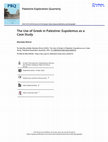Articles by Marieke Dhont

Palestine Exploration Quarterly, 2022
Eupolemus, a Jewish historian generally dated to the second century BCE, is often dismissed as a ... more Eupolemus, a Jewish historian generally dated to the second century BCE, is often dismissed as a poor Greek writer. This lack of competency is linked to the assumptions that, as a Jew, he had limited Greek-language education and that he lived in Palestine, where Greek supposedly would have been marginal. The example of Eupolemus is illustrative of two issues in the study of Hellenistic Judaism. First, it calls into question the methods used for determining standard language and the measures by which we assess the style and ability of an ancient writer. Second, it calls for an assessment of the language situation in Palestine in the Hellenistic period. Advances in the study of the history of Greek have enabled a renewed appreciation of post-classical Greek, while twentieth century discoveries have allowed for a better understanding of the extent to which Greek was used in this region. In addition, the study of multilingualism in antiquity has progressed significantly, so that we are able to obtain a more nuanced understanding of Palestine as a multilingual environment where Jews, too, would use Greek alongside Hebrew and/or Aramaic in varying registers and for different purposes. In this article, I describe Eupolemus’s style against the background of post-classical Greek and reassess the link between linguistic proficiency, identity, and provenance.
Journal for the Study of the Pseudepigrapha, 2020
The style of the Jewish-Greek historiographers Eupolemus and Demetrius has often been evaluated a... more The style of the Jewish-Greek historiographers Eupolemus and Demetrius has often been evaluated as "bad Greek." This is generally seen as evidence of their lack of education. The negative views on the language of Demetrius and Eupolemus are illustrative of a broader issue in the study of Hellenistic Judaism: language usage has been a key element in the discussion on the societal position of Jews in the Hellenistic world. In this article, I assess the style of the historiographers in the context of post-classical Greek, and conclude that their language reflects standard Hellenistic Greek. The linguistic analysis then becomes a starting point to reflect on the level of integration of Jews in the Greek-speaking world as well as to consider the nature of Jewish multilingualism in the late Second Temple period.

Vetus Testamentum, 2019
No two translations within the Septuagint corpus are the same: some texts have been translated "l... more No two translations within the Septuagint corpus are the same: some texts have been translated "literally," others "freely," some are written in "good," others in "Hebraizing" Greek. Scholars studying the translation technique of the Septuagint have generally been focusing on individual books, or on groups of books that appear to be closely related, such as the Pentateuch or the Minor Prophets. The diverse character of the books in the Septuagint has made it difficult to see these translations as part of a literary corpus in which texts all relate to one another. However, these books all belong
broadly to the same context, namely that of Greek-speaking Jews in the Hellenistic era. I propose a new approach to understand how we can understand the diversity regarding style and translation technique in the Septuagint corpus, by looking at the way in which Jews developed their own literary traditions in Greek.
In: S. Kreuzer et alii (eds.), Die Septuaginta: Geschichte – Wirkung – Relevanz. 6. Internationale Fachtagung veranstaltet von Septuaginta Deutsch (LXX.D), Wuppertal 21.–24. Juli 2016 (Wissenschaftliche Untersuchungen zum Neuen Testament), Tübingen: Mohr Siebeck (forthcoming).
Published in: Ezra (2016) 44-53
Published in: in: W. Kraus, M. Meiser & M. van der Meer (eds.), XV Congress of the International ... more Published in: in: W. Kraus, M. Meiser & M. van der Meer (eds.), XV Congress of the International Organization for Septuagint and Cognate Studies, Munich 2013 (Society of Biblical Literature Septuagint and Cognate Studies), Atlanta, GA: Scholars Press, 2016, 357-374
Published in: in: S. Kreuzer et alii (eds.), Die Septuaginta: Orte und Intentionen. 5. Internatio... more Published in: in: S. Kreuzer et alii (eds.), Die Septuaginta: Orte und Intentionen. 5. Internationale Fachtagung veranstaltet von Septuaginta Deutsch (LXX.D), Wuppertal 24.–27. Juli 2014 (Wissenschaftliche Untersuchungen zum Neuen Testament 361), Tübingen: Mohr Siebeck, 2016, 475-490
Published in: R. Burnet, H. Derroitte & É. Gazieux (eds), La transition, un concept théologique? ... more Published in: R. Burnet, H. Derroitte & É. Gazieux (eds), La transition, un concept théologique? (Études de théologie et d'éthique), Berlin: Lit Verlag, 2016
Journal of Septuagint and Cognate Studies 47, 2014
Zeitschrift für die alttestamentliche Wissenschaft 126 (pp. 111-116), 2014
This note takes a new look at the LXX rendering of Job 20,25, and proposes to explain the transla... more This note takes a new look at the LXX rendering of Job 20,25, and proposes to explain the translational divergence on the basis of the translation technique of LXX Job.
Historical and Theological Lexicon of the Septuagint (ed. E. Bons & J. Joosten)
Associatie KULeuven. ...
Historical and Theological Lexicon of the Septuagint (ed. E. Bons & J. Joosten)
Indian Theological Studies 50 (pp. 133-152), 2013
Ezra 18 (pp. 44-57), 2013
Ancient Worlds in Film and Television. Gender and Politics (Metaforms, 1), 2012
Associatie KULeuven. ...
Byzantion 81 (pp. 203-211), 2011
This article focuses on an anonymous ascetic text which is unpublished until now, and offers the ... more This article focuses on an anonymous ascetic text which is unpublished until now, and offers the critical edition of this short work containing a series of recommendations to Athonite monks, alphabetically organized and ending with the letter gamma; the text is preserved in two manuscripts: Athous, Dionysiou 269, of the XVth c., and Athous, Lavra K 116, of the XVIth c.
Boekman Cahier 84 (pp. 57-65), 2010










Uploads
Articles by Marieke Dhont
broadly to the same context, namely that of Greek-speaking Jews in the Hellenistic era. I propose a new approach to understand how we can understand the diversity regarding style and translation technique in the Septuagint corpus, by looking at the way in which Jews developed their own literary traditions in Greek.
broadly to the same context, namely that of Greek-speaking Jews in the Hellenistic era. I propose a new approach to understand how we can understand the diversity regarding style and translation technique in the Septuagint corpus, by looking at the way in which Jews developed their own literary traditions in Greek.
After discussing the appropriateness of a systemic approach to understanding Jewish-Greek literature, the author reflects on the Jewishness of Greek-language texts. Dhont then presents a thorough literary analysis of the Old Greek version of the book of Job. On this basis, she explains the dynamics that produced the translation of Old Greek Job and its position within the development of a Jewish-Greek literary tradition.